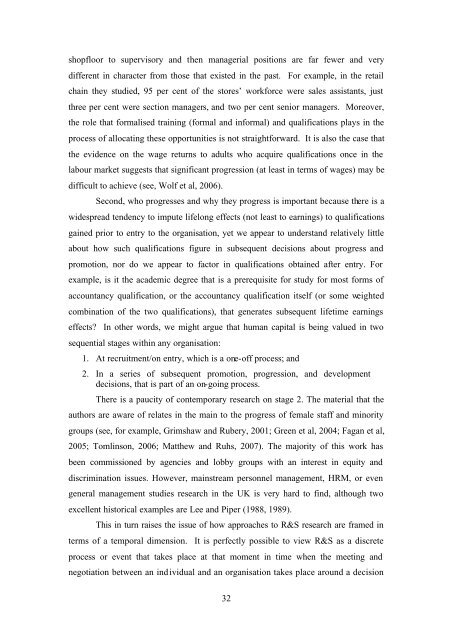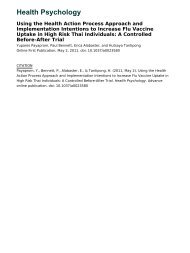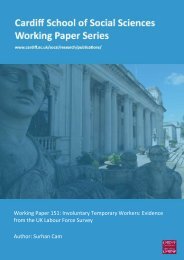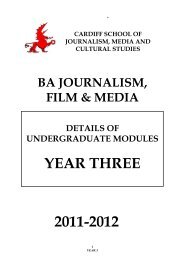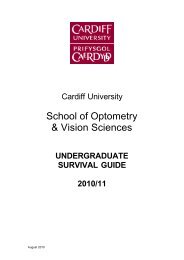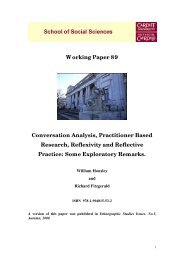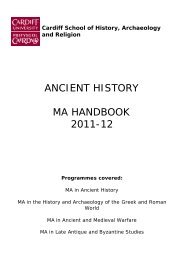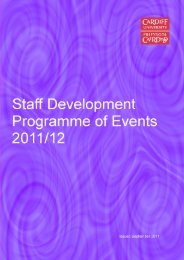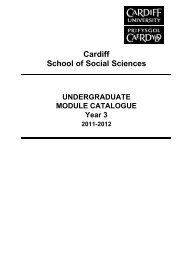Recruitment and Selection â the Great Neglected ... - Cardiff University
Recruitment and Selection â the Great Neglected ... - Cardiff University
Recruitment and Selection â the Great Neglected ... - Cardiff University
You also want an ePaper? Increase the reach of your titles
YUMPU automatically turns print PDFs into web optimized ePapers that Google loves.
shopfloor to supervisory <strong>and</strong> <strong>the</strong>n managerial positions are far fewer <strong>and</strong> very<br />
different in character from those that existed in <strong>the</strong> past. For example, in <strong>the</strong> retail<br />
chain <strong>the</strong>y studied, 95 per cent of <strong>the</strong> stores’ workforce were sales assistants, just<br />
three per cent were section managers, <strong>and</strong> two per cent senior managers. Moreover,<br />
<strong>the</strong> role that formalised training (formal <strong>and</strong> informal) <strong>and</strong> qualifications plays in <strong>the</strong><br />
process of allocating <strong>the</strong>se opportunities is not straightforward. It is also <strong>the</strong> case that<br />
<strong>the</strong> evidence on <strong>the</strong> wage returns to adults who acquire qualifications once in <strong>the</strong><br />
labour market suggests that significant progression (at least in terms of wages) may be<br />
difficult to achieve (see, Wolf et al, 2006).<br />
Second, who progresses <strong>and</strong> why <strong>the</strong>y progress is important because <strong>the</strong>re is a<br />
widespread tendency to impute lifelong effects (not least to earnings) to qualifications<br />
gained prior to entry to <strong>the</strong> organisation, yet we appear to underst<strong>and</strong> relatively little<br />
about how such qualifications figure in subsequent decisions about progress <strong>and</strong><br />
promotion, nor do we appear to factor in qualifications obtained after entry. For<br />
example, is it <strong>the</strong> academic degree that is a prerequisite for study for most forms of<br />
accountancy qualification, or <strong>the</strong> accountancy qualification itself (or some weighted<br />
combination of <strong>the</strong> two qualifications), that generates subsequent lifetime earnings<br />
effects? In o<strong>the</strong>r words, we might argue that human capital is being valued in two<br />
sequential stages within any organisation:<br />
1. At recruitment/on entry, which is a one-off process; <strong>and</strong><br />
2. In a series of subsequent promotion, progression, <strong>and</strong> development<br />
decisions, that is part of an on-going process.<br />
There is a paucity of contemporary research on stage 2. The material that <strong>the</strong><br />
authors are aware of relates in <strong>the</strong> main to <strong>the</strong> progress of female staff <strong>and</strong> minority<br />
groups (see, for example, Grimshaw <strong>and</strong> Rubery, 2001; Green et al, 2004; Fagan et al,<br />
2005; Tomlinson, 2006; Mat<strong>the</strong>w <strong>and</strong> Ruhs, 2007). The majority of this work has<br />
been commissioned by agencies <strong>and</strong> lobby groups with an interest in equity <strong>and</strong><br />
discrimination issues. However, mainstream personnel management, HRM, or even<br />
general management studies research in <strong>the</strong> UK is very hard to find, although two<br />
excellent historical examples are Lee <strong>and</strong> Piper (1988, 1989).<br />
This in turn raises <strong>the</strong> issue of how approaches to R&S research are framed in<br />
terms of a temporal dimension. It is perfectly possible to view R&S as a discrete<br />
process or event that takes place at that moment in time when <strong>the</strong> meeting <strong>and</strong><br />
negotiation between an individual <strong>and</strong> an organisation takes place around a decision<br />
32


